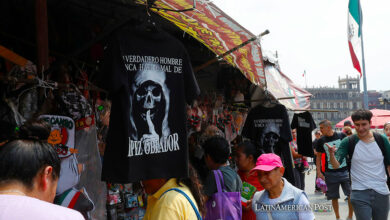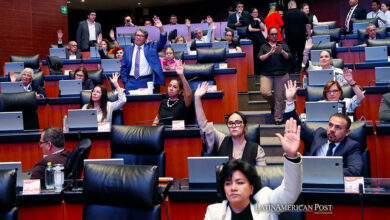Three Cubans face up to 30 years in prison for purported anti-government propaganda and violence in a case highlighting Cuba's stringent approach to dissent and external influence.

Photo: National Capitol of Havana.
The Latin American Post Staff
Escucha este artículo
Leer en español: Las duras sentencias impuestas a Cuba por presuntos actos antigubernamentales
In a recent development highlighting the Cuban government's strict stance on dissent, three Cuban nationals are potentially facing lengthy prison sentences, ranging from 20 to 30 years. According to state-run media, these individuals are accused of engaging in anti-government propaganda and committing acts of violence, allegedly under foreign influence.
Prosecutors have focused their allegations on a man and two women who are said to have thrown petrol bombs at a facility in central Havana, which stores case files for a local courthouse. This incident was reported in a late Sunday newscast and has since sparked significant attention both within and outside Cuba.
Assault on Committees for the Defense of the Revolution (CDRs)
Further accusations against the trio include an assault on the Havana provincial headquarters of the Committees for the Defense of the Revolution (CDRs). CDRs are community-based committees across Cuba tasked with mobilizing support for the government and keeping watch over neighborhood activities.
The Cuban authorities assert that the three accused received external financial support and communication aids for executing these attacks. They were allegedly provided with cell phone plan top-ups and around 10,000 pesos (equivalent to about $37 at the black market exchange rate) from groups outside Cuba. In exchange, they were to conduct the attacks and spread what the authorities described as "enemy propaganda."
Related Terrorist Plot and International Connections
The news of this trial, which did not disclose its date in the broadcast, comes amidst another revelation by Cuba. The government claimed to have thwarted a related terrorist plot, supposedly planned in the United States. This scheme involved an armed individual who allegedly traveled to Cuba via jetski to commit acts of violence.
The Cuban government has linked the jetski plot to several Cubans residing in the United States, as well as to at least two groups: Nueva Nacion Cubana and La Nueva Nacion Cubana en Armas. Notably, Cuba recently included these groups in its newly published list of terrorist entities.
Authorities further allege that Cubans connected to at least one of these groups, among others based abroad, orchestrated the attacks on the courthouse and CDR headquarters. These individuals are being labeled as "terrorists" by the Cuban government, accused of seeking to disrupt the peace and order within the country.
Implications for Political Activism and Dissent in Cuba
In Cuba, crimes related to terrorism are met with severe penalties. The Cuban legal system allows for sentences ranging from 30 years in prison to life imprisonment or even the death penalty for such offenses, as stated in the newscast.
The severity of the proposed sentences in this case underscores the Cuban government's unwavering approach to maintaining control and suppressing any form of dissent or perceived threats to its authority. The involvement of alleged foreign entities in these incidents, as claimed by the authorities, further complicates the situation, adding an international dimension to what the government deems as attempts to destabilize Cuba.
This situation sheds light on the broader political and social dynamics context in Cuba, where the government maintains a tight grip on dissent and opposition. If found guilty, the accused may spend decades behind bars, a fate that highlights the risks associated with political activism and dissent in the country.
International Attention and Scrutiny
As the trial progresses, it will likely attract international attention and scrutiny, especially from human rights organizations and foreign governments. The outcome of this case could have significant implications for the perception of Cuba's judicial system and its approach to handling cases involving political crimes and external influences.
Moreover, the incident reflects the ongoing tensions between Cuba and external entities, particularly those based in the United States. It underscores the complex interplay between domestic politics in Cuba and the influence of Cuban diaspora communities and organizations abroad.
Also read: Cuba Foils Alleged Terror Plot Originating from Florida
As the world watches, the unfolding legal drama in Cuba serves as a stark reminder of the challenges faced by those who oppose the government in countries with stringent anti-dissent laws. The resolution of this case will not only determine the fate of the three accused but also contribute to the ongoing discourse on political freedom, human rights, and international relations in the context of Cuba.





